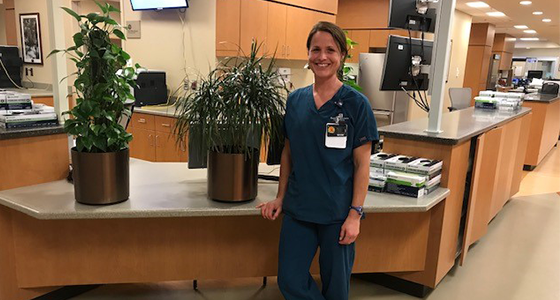From her early training as a backcountry mountain bike guide to her current role as an emergency department nurse, Julia Ryder’s love of the outdoors has always informed her career. As a kid, she roamed the woods behind her Wisconsin home from morning to dusk, sparking a lifelong connection with the natural world.
“I have always lived with full awareness that without Mother Nature I would lose my purpose,” said Ryder, who has lived in Bozeman, Mont., since 2011. “Nature is my constant – where I find peace, strength, playfulness, connection to friends, and the meaning of life.”
Ryder’s awareness of climate change also started young. She first learned how humans impact the environment as a fourth-grader in 1989, and she promptly quizzed each of her neighbors on their recycling habits. As an adult, she witnessed the healing power of nature by using wilderness therapy to help children and teens overcome behavioral problems and drug addiction, a passion that steered her toward a health care career.
“The idea of nursing grew from these experiences,” she said. “I was very comfortable working with a variety of people, knew how to heal emotionally, and had strong first aid skills.”
But it wasn’t until Ryder started working in the emergency department at Bozeman Deaconess Hospital six years ago that she noticed the direct link between climate change and her patients’ physical and mental health. Her wilderness therapy training allowed her to see the connection between depression and the environment, including the detrimental effects of increased pollution and a lack of sunshine and healthy food.
“With longer, drier seasons, we also have worsening fires,” she said. “In 2017 we had the worst fire season in the history of Montana, which created terrible air pollution. Through understanding the link between climate change and health, you can better link symptoms to the cause, such as an increase in difficulty breathing on poor quality air days.”
When Ryder first started talking to her colleagues about climate change, she found it helpful to focus on health impacts and the specific reasons why change was needed. “I knew people would not change their behavior unless they knew why the change was important,” she explained. “So the first step to making any difference in your hospital is education.”
Ryder began searching for resources to increase her own knowledge and educate her fellow health care providers, and that’s when she discovered the Nurses Climate Challenge. Armed with resources, Ryder began giving presentations on climate change, starting with the education department at Bozeman Deaconess Hospital. Next she presented at her hospital’s weekly “lunch and learn,” which offers CE credit for attendance. She has also spoken via Skype to first-year nursing students at the University of Vermont, and she has collaborated with medical students on upcoming presentations.
“I have added my own slides that depict the local effects of climate change,” she said. “My slides include information about Bozeman Health Deaconess, including how much energy we use, the amount of trash we create, the good things we are doing, and what I have done in my department. I have made my slideshow very solution-based, and I have a list of what other well-known hospitals are doing for sustainability.”
Since she began speaking about climate change, Ryder has gotten positive feedback, with many of her colleagues sharing her presentation with other departments and asking what they can do to be more sustainable and environmentally friendly. Ryder also takes the time to educate her patients, providing them with in-depth discharge information on eating well, getting outside daily, and reducing toxin exposure.
“Nurses have been rated as the most trusted profession, which allows us to begin the discussion of climate and health,” she said. “Nurses make up the largest group of employees in health care, which means if we make change it can spread quickly and be lasting. But it’s more than that – if we understand how the environment affects our patients, we can provide better care and be better nurses.”
Because education is the first step to making change, Ryder encourages all nurses to join the Nurses Climate Challenge. She recommends starting small, such as having a simple discussion with peers, and building up to giving larger presentations that have a broader reach. “After this education begins to filter through your hospital, recycling bins and other sustainability projects will be used and well received,” Ryder said.
“My passion for nursing has been reignited with my commitment to bringing awareness about climate change,” she added. “The effects of climate change go beyond the bedside and reach our community, friends, and loved ones. Now my nursing doesn't only protect one patient – it protects my whole community.”
Julia Ryder, RN, BSN, is a registered nurse at Bozeman (Mont.) Deaconess Hospital. She lives in Bozeman with her boyfriend and their two dogs, Roamer and Jake. When she is not at work or reading up on climate change, she enjoys teaching yoga, riding her bike, running, and skiing.
